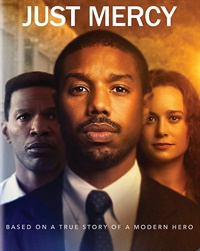Description
Just Mercy and Access to Justice: Illuminating Bias, Confronting Systemic Racism, and Doing the Hard Work that Needs to be Done
(2 hours MCLE credit, incl. Ethics & Professionalism, Bias/Access to Justice, and Well-Being/Mental Health Awareness)
Just Mercy brings to life the powerful and thought-provoking true story of newly-minted lawyer Bryan Stevenson and his history-making battle for justice on behalf of innocent people wrongfully convicted. Stevenson’s story of navigating multiple levels of appeal and habeas corpus review, serving the most underserved criminal defendants, and confronting the demons of overt racism and implicit bias presents a perfect catalyst for engaging conversations about the cracks and flaws in our system, and what seemingly “ordinary” lawyers can do about it.
With its honest portrayal of the toll that this kind of work takes on a lawyer, the film also provides a profound opportunity to consider how lawyers can (a) develop greater resilience in the face of adversity, and (b) develop a sustainable passion for doing meaningful work to provide greater access to justice for the underserved. Our own Michael Kahn, JD, LPC will provide practical tips and strategies for engaging in this gut-wrenching work without burning out in the process.
To make sure this program is practical and well-informed, we will be joined in this conversation by folks “in the trenches”—not only those who have been doing the hard work of exonerating the innocent, but also some of the grateful clients who have benefitted from that work. Our Special Guests for this roundtable discussion will include:
Ricky Kidd, founder of the I AM RESILIENCE movement, following his exoneration and release from a prison after serving 23 years for a double-murder he did not commit
Joseph Amrine, wrongfully convicted of capital murder in 1986, and fully exonerated in 2003 by the Missouri Supreme Court based on "clear and convincing evidence of actual innocence that undermines confidence in his conviction.”
Professor Sean O’Brien, University of Missouri-Kansas City Law School (Board Member of Miracle of Innocence and longtime criminal defense clinic supervisor and innocence lawyer)
Quinn O’Brien, adjunct Instructor at University of Missouri-Kansas City School of Law, and lead private investigator in numerous successful exonerations
This lively, interactive virtual webinar will provide practical takeaways and guidance for developing resilience that are applicable for lawyers in all kinds of practice areas and all types of cases.
TIMED AGENDA (2.0 Hour Webinar Version)
Each segment will feature film clips from Just Mercy, along with a lively and engaging Roundtable Discussion with our Special Guests. There will also be plentiful opportunities for attendees to offer feedback and ask questions on each topic.
1 Hour “Illuminating Bias-and Confronting Racism”- The Role of Unconscious Bias and Systemic Racism in Hindering Access to Justice (Ethics, Bias, or General Credit)
30 min. “It’s Just a Flesh Wound!” – The Reality of Vicarious Trauma, and the Costs of Caring About our Clients (Professionalism or Well-Being/Subst. Abuse/MH Credit)
30 min Failure is an Option—and Somewhat Inevitable: Developing Resilience and Maintaining Well-Being (Professionalism or Well-Being/Subst. Abuse/MH Credit)
LEARNING OBJECTIVES
Participants in this live webinar will be encouraged and equipped to:
1. Identify implicit biases and understand how they operate, as well as the settings and circumstances in which they are more likely to show up
2. Recognize the hallmarks of systemic racism, and commit to the path of pursuing anti-racism, instead of staying silent and thereby compounding existing problems
3. Employ practical tools and strategies for confronting instances of bias and systemic injustices or inequities
4. Take practical steps to help providing meaningful access to justice for the chronically disadvantaged and marginalized
5. Understand the concept of vicarious trauma, and how to develop effective habits and commitments to sustainable and effective self-care and well-being, no matter what type of law or in what settings they practice
Handouts
| Just Mercy Materials (4.3 MB) | Available after Purchase | ||


